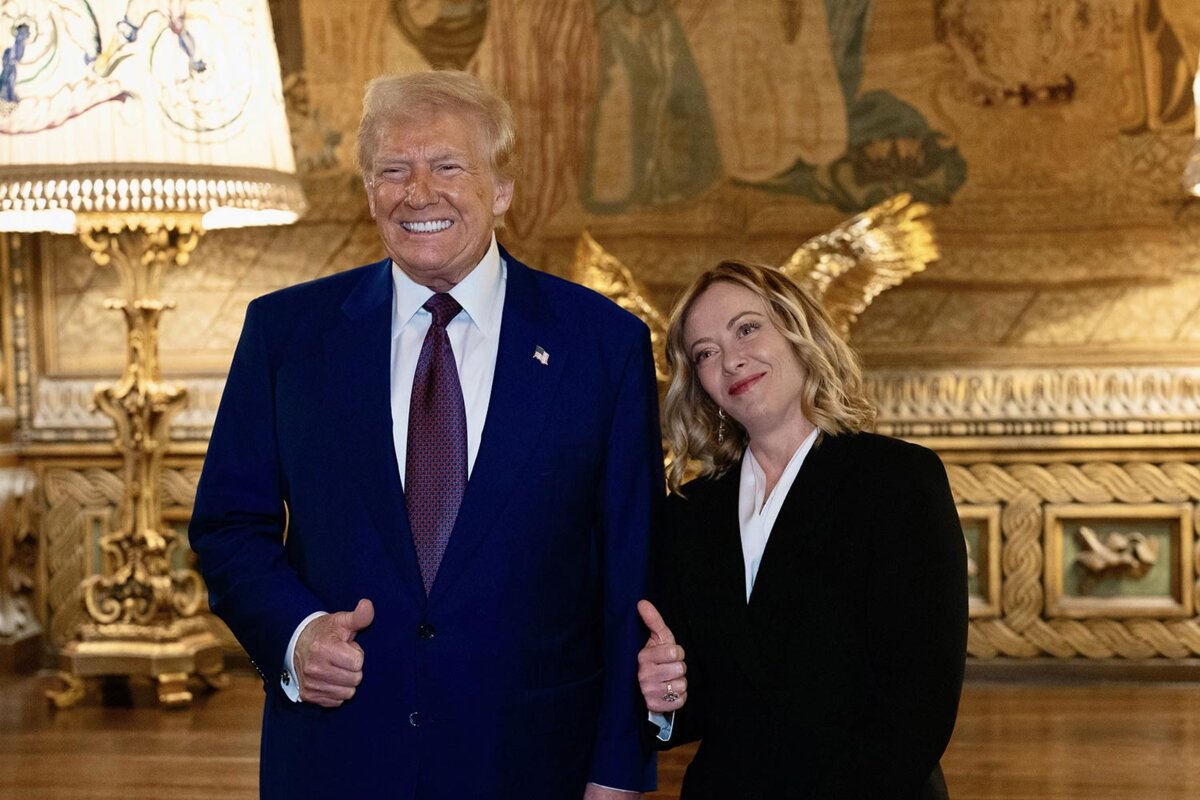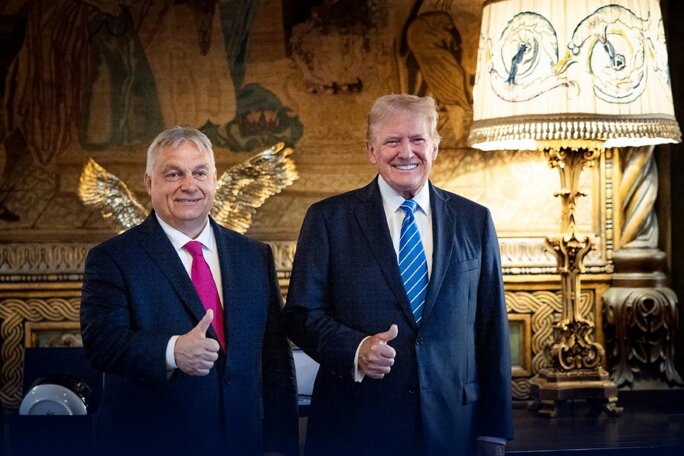The return of Donald Trump to the White House brings profound changes to relations between the US and Europe. Since his election last November, Trump has made very clear that the “Old Continent” will not escape from his predatory imperialism.
The threat of raising tariffs on imports of European goods is part of establishing policies favourable to those sectors that helped bring the former real estate magnate to power, notably Big Tech and the energy sector. But to impose his views on Europe, Trump intends to employ local political forces.
He used his inauguration ceremony to send messages to those who he considers to be his friends across the Atlantic, and those he doesn’t. While, in general, foreign heads of state do not take part in the swearing-in, the new administration distributed invitations that effectively trace a clear line between his supporters and enemies. Thus it was that Italian Prime Minister Giorgia Meloni was invited, but not Ursula von der Leyen, president of the European Union (EU) Commission.

Enlargement : Illustration 1

While the French and German governments were represented by their ambassadors to Washington, Trump chose to invite members of the opposition in the two countries. In the case of Germany, Alice Weidel, head of the far-right AfD (Alternative for Germany) party who has received the outspoken backing of billionaire Elon Musk, the Tesla and Space X boss who is the new strongman of the Trump administration, was invited. She declined for reasons of the impending German legislative election campaign, and was replaced by the conspiracy theory-mongering and xenophobic AfD co-chairman, Tino Chrupalla.
The ceremony on Monday brought together numerous members of Europe’s far-right. These included Santiago Abascal, head of Spain’s Vox party, Tom Van Grieken, head of the Flemish Vlaams Belang party in Belgium, alongside George Simion, president of the Romanian nationalist AUR party, and Austrian member of parliament for the far-right FPÖ party, Susanne Fürst, standing in for party chairman Herbert Kickl who is currently involved in negotiations to form a coalition government in Vienna.
From the French far-right, Trump chose to invite Éric Zemmour, founder and leader of the marginalised Reconquête party, along with his wife Sarah Knafo, a member of the European Parliament. The far-right Rassemblement National party, the largest single party in the French parliament, sent representatives that were part of a larger delegation from the European Parliament far-right group Patriots for Europe. Trump picked out the far-right that he prefers, which is the most identitarian possible.
Rassemblement National (RN) chairman Jordan Bardella, confirming his absence at Trump’s inauguration ceremony, last week underlined the presence of the Patriots for Europe group, of which he is also chairman. “My group in the European Parliament, which is the third force in the European Parliament, was invited,” he said. “One gets the impression that it’s Walt Disney and that it’s a race to go and be photographed in front of Donald Trump during his inauguration speech.” Bardella added: “But to like the patriotism of Donald trump, that doesn’t mean being a vassal of the United States of America. Trump will defend the interests of the United States. He will probably be very hard with France and Europe on trade issues.”
In reality, the RN, viewed by the Trump camp as too statist and too little connected to the tech industry, does not fit Trump’s hegemonic strategy, unlike most members of the European Parliament group that Bardella leads.
Giorgia Meloni, the bridge between Trumpism and Europe
Within the European camp of Trump allies, two figures stand out because of the fact that they are in power. One is the Hungarian prime minister, Viktor Orbán, and the other is his Italian counterpart Giorgia Meloni. The inauguration ceremony has served to clarify the balance of power between the two, who seek to represent European ‘Trumpism’. While Meloni was present at the gathering, Orbán stayed in Budapest where he gave a speech on Monday on the results of Hungary’s term, in the second half of 2024, as occupant of the rolling presidency of the EU Council, when he referred to what he called a “transformation of the Western world” and the start of “a new era”. But it was unclear, amid claim and counter claim, whether he had in fact received an invitation to the gathering.
Whatever, it is Meloni who appears destined to become the privileged partner for the Trump administration’s relations with the EU. After her visit at the beginning of January to Trump’s Florida residence of Mar-a-Lago, the then president-elect described her as “a fantastic woman” who was “taking Europe by storm”. But finding favour with Trump was not a given: Meloni had excellent relations with Joe Biden and she initially appeared unenthusiastic at the news of Trump’s election victory in November, while Orbán is a longstanding supporter of Trump’s with regular appearances alongside him, thumbing it up as required.

Enlargement : Illustration 2

But Meloni used the weeks between the election result and the inauguration to become a key figure for the new administration. For that, she has been able to call on he who she describes as her “friend” , Elon Musk, with whom she has had close relations over recent years. While the Italian government appears on the point of signing a 1.5 billion-euro contract with Musk’s Space X company for use of its satellite telecommunications system Starlink, Musk, according to The New York Times, successfully negotiated directly with the Iranian authorities, without involving the Biden administration, for the release of Italian journalist Cecilia Sala, detained in Tehran in December.
During a lengthy press conference in Rome on January 9th, Meloni said the welcome she received just days earlier when she visited Trump in Florida was “beyond expectations”. She notably defended Musk over his meddling in European politics, arguing that the billionaire was not “dangerous to democracy”.
"You may like it or not, but when I am told that there is a danger of interference, I point out that it is not the first case of well-known and wealthy people who express their opinions […] The problem is when these people use resources to finance parties and associations around the world to influence policies, something that I do not see Musk doing unlike [George] Soros […] Is the problem that [Musk] is rich and influential, or that he’s not leftwing?”
While Viktor Orbán’s profile is somewhat problematic for the new US administration, the choice of Meloni as the bridge with Europe is an obvious one. Orbán is close to the Kremlin and his policies are quite statist, while his Italian counterpart is an enthusiastic Transatlantist who espouses neoliberal economic policies. While Orbán may be a model for a number of European far-right leaders, his influence barely travels further than that, and his government has been regularly sanctioned by the EU for its non-respect of legal rights.
On the opposite, Meloni, who has played a central role in European governance, and is held in respect by the EU Commission, appears for the Trump administration as its ideal Trojan Horse in Europe.
The issue of Ukraine
On the domestic front, her proximity with Musk and Trump has further served to distance herself from her political ally-cum-rival Matteo Salvini, Italy’s deputy prime minister from the Lega party.
But above all, that proximity and the attention it has given her represents something of a revenge against the so-called French and German “couple”, the alliance of Paris and Berlin which was for long seen as the power house in European affairs, and which the Italian far-right lambasted as marginalising Rome within the EU. In 2022, the year she became prime minister, Meloni pledged to undermine the Paris-Berlin axis, and she has claimed her presence at Trump’s inauguration ceremony was an illustration of Italy’s newly found place at the centre of European and even international affairs. In contrast, Ursula von der Leyen, president of the European Commission, remained in Brussels on Monday.
But in reality, in the new Trumpist order, allies are nothing other than pawns who are moved around the board according to requirements. For the moment Meloni is useful, notably for the purposes of weakening the EU in favour of the new US administration’s political and economic conditions. But it is not certain that she will succeed in holding that position.
For a central issue in the relationship is the war in Ukraine. During her January 9th press conference, Meloni said "I do not expect a disengagement by the United States from Ukraine". She has been one of Ukraine’s staunchest supporters since the war began, and could therefore be useful for Trump in helping to persuade Kyiv to sit at the negotiating table with Moscow – although to persuade the Kremlin to do the same would more likely involve Orbán and his pro-Russian allies in Slovakia and Austria.
What should be understood about the European far-right who were present in Washington on Monday is that Trump will use them according to his objectives, the objectives of a predatory strategy, one which threatens these new allies with becoming nothing more than the US president’s useful idiots.
-------------------------
- The original French version of this report can be found here.
English version by Graham Tearse


